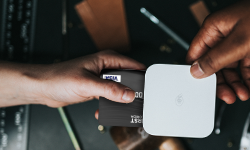If you've ever been on Facebook or any other social media network, you've probably had someone on your friend's list announce that they've been hacked. In most cases, they weren't hacked, but instead phished — although those two things can work hand in hand. It's not your imagination — social media scams (like many other forms of scams) are on the rise. According to the Federal Trade Commission (FTC), more than 95,000 Americans reported about $770 million in losses to fraud initiated on social media platforms in 2021. With scams on the rise, we're sharing information on phishing and types of social media scams so you can protect yourself.
About Hacking, Phishing, Spear-Phishing, Smishing, and Vishing:

What is Hacking?
Hacking refers to activities that seek to compromise digital devices like computers, smartphones, tablets — even entire networks. Though, there are malicious hackers that will try to gain access to your personal financial information, hacking may not always be for malicious purposes:
White Hat Hacker
A white hat hacker works to improve the security of an organization's security system by seeking out flaws to prevent identity theft or other types of cybercrimes before a malicious threat happens.
Black Hat Hacker
A black hat hacker breaks into systems for malicious intent — theft, corporate espionage, reputation building by vandalizing digital property, and nation-state hacking.
Gray Hat Hacker
A gray hat hacker, like a black hat hacker, will use their skills to enter systems without permission. Gray hat hackers work by their own code of ethics and may not disclose system flaws, or they may report their discovery to the target and offer to repair the system's vulnerability for a small fee.
What is Phishing?
Phishing is a social engineering technique that manipulates people into sharing sensitive, personal information. Phishing scams come in many forms — emails, text messages (smishing), direct messages, phone calls or voice messages (vishing), pop-ups, social media, and more.
These types of scams create a sense of urgency to trick you into taking action, like clicking on a link, downloading an attachment, or sharing account information. Scammers can be especially convincing when they use spear-phishing techniques.
What is Spear-phishing?
Spear-phishing is when scammers use information they already have about you to craft personalized and professional looking messages that appear to be from a trusted source, such as a co-worker, vendor, relative, or other organization (like your financial institution), to obtain confidential information.
What's the Difference Between Hacking and Phishing?
With hacking, information is extracted involuntarily as opposed to phishing, where the victim is baited into voluntarily sharing personal information.
Types of Social Media Scams
Social media is a profitable method for malicious individuals to scam others because it's a low-cost way to of reaching billions of people from around the world and offers a key element that a phishing scam needs to succeed — personal information that can be manipulated. With these potential dangers, it may be tempting to get rid of your social media accounts. However, practicing caution and knowing the types of social media scams that are out there, can help you to avoid falling victim to a fraud and allow you to enjoy connecting with friends, family, and colleagues.
Direct Message Scams
Scammers will use direct message (DM) on a social media platform to contact you. Often, they'll impersonate a friend and send a private message to you asking for help or word a message to get you to click on a link. The link may take you to a bogus sign-in site and once you enter your information, they are able to steal your credentials. Also, if a friend messages you in need of financial help, call them to verify. Your friend's account may have been compromised — especially if a "friend" asks you to pay by cryptocurrency, gift card, or wire transfer.
Crypto Investment Scams
Crypto investment scams are a type of investment scam that promises you can "make lots of money" with "zero risk". Crypto investment scams often start on social media or online dating apps or sites. However, they can also begin with an unexpected text, email, or call. Crypto investment scams use phishing techniques, usually in the form of a link to:
- Gain a person's account credentials to take over the account and spam the victim's friends (ultimately continuing the cycle and further spread the scam)
- Get a person to "invest" in cryptocurrency on their fake investment site(s)
- Give over existing crypto credentials so the thief can steal your money
Scammers may also pose as celebrities or influencers claiming they are able to multiply any cryptocurrency that you send them. But, more than likely, celebrities aren't contacting you through social media and once you click on the link that they send or send cryptocurrency to a "celebrity's" account, it will go straight to the scammer instead.
Romance Scams
Romance scammers will create fake profiles on social media sites and dating sites to connect with their target. They move the "relationship" along quickly and eventually ask for money for an "urgent" reason. You should never transfer money from your account, buy gift cards, wire money, or send cryptocurrency to an online love interest.
Fake Advertisements
Scammers will create fake advertisements that look like they are coming from legitimate companies to get people to buy products that don't actually exist. Most commonly, people order items that are advertised online, but will never receive the items. According to the FTC, fake advertisement scams accounted for 45% of the reports of social media scams in 2021.
"Help!" or "Person in Need" Scams
There will always be fraudsters who take advantage of tragic situations or try and prey on your good nature and willingness to help others. During times of crisis, like the COVID-19 pandemic or the war in Ukraine, these scammers will pose as a person in need or charity organization asking for money. Another form of a "help!" or "person in need" scam is commonly referred to as the "grandparent scam". Scammers will pose as a grandchild or relative of an intended victim and claim to be in an unfortunate situation — stuck in a foreign country or have gotten arrested — and are in urgent need of financial help.
Other Scams
While investment scams, romance scams, and online shopping fraud/fake advertisements accounted for over 70% of reported losses to social media scams in 2021, there are may other types of scams out there — and new ones popping up every day. Restricting what you share and following safe social media practices can help you and your family stay safe.
We'll Lend A Helping Hand
Members First Credit Union of Florida is committed to your financial well-being and keeping your personal data safe and secure. If you have any questions about activity on your account, an email or social media post from us, or any other communication that seems suspicious, do not hesitate to give us a call at (850) 434-2211 or stop by one of our branch locations.
RESOURCES
« Return to "Blog"










